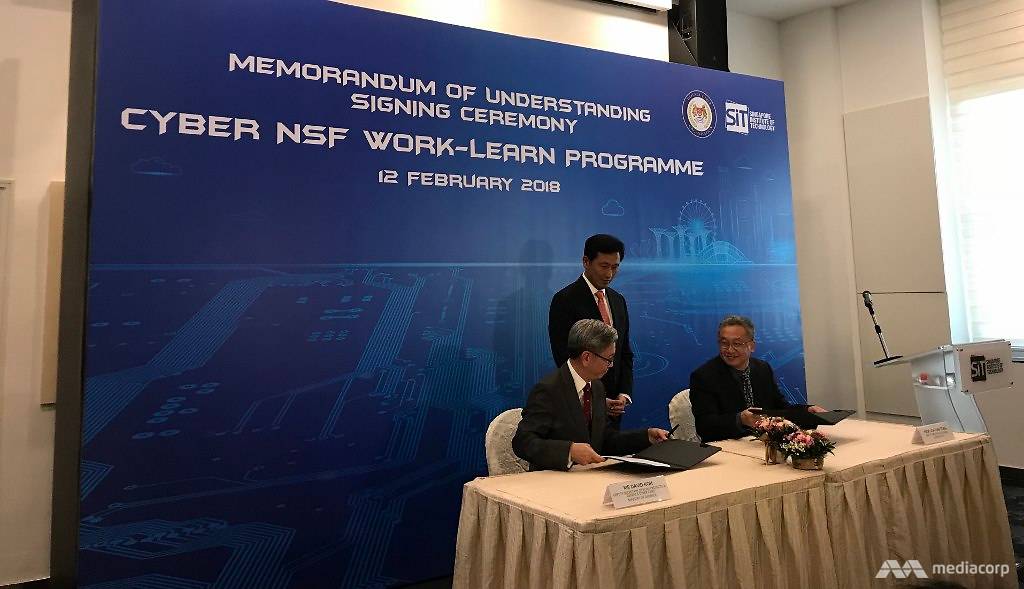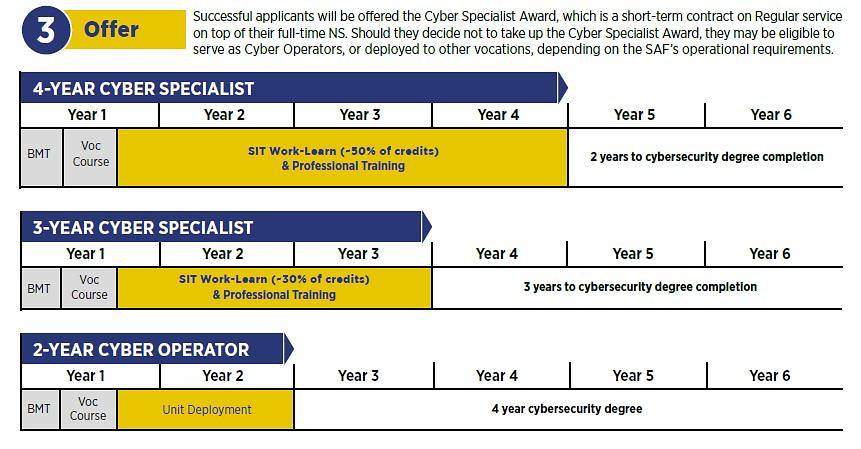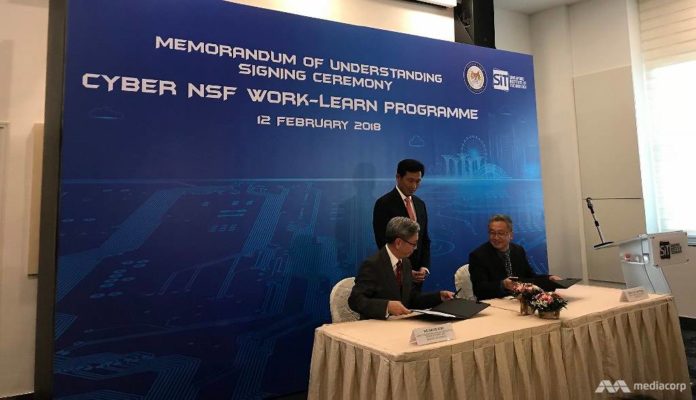SINGAPORE: Full-time national servicemen (NSFs) who are assigned to cyber vocations will come under a newly announced Cyber NSF scheme, and those who demonstrate the required aptitude and skill will be eligible for the Cyber Specialist Award, said Second Minister for Defence Ong Ye Kung on Monday (Feb 12).
The Cyber Specialist Award is a short-term contract offered to NSFs in cyber vocations who demonstrate the requisite aptitude and skill and meet the “stringent selection requirements”, Mr Ong added.
This award is made possible through the signing of a work-learn memorandum of understanding (MOU) between the Ministry of Defence and the Singapore Institute of Technology (SIT) on Monday. It is the first work-learn programme between the ministry and an education institute where NSFs are sent for academic upgrading while employed in an operational role, the press release said.
This was done via a collaboration between MINDEF and the Defence Cyber Organisation and the Ministry of Education and SIT, with support from SkillsFuture Singapore, it added.

Second Minister for Defence Ong Ye Kung (standing) watching on as the work-learn programme MOU was signed between Mr Koh and Prof Loh.
The new cyber defence vocation within the Singapore Armed Forces (SAF) was first revealed by Defence Minister Ng Eng Hen in last year’s Committee of Supply debate, together with the creation of the Defence Cyber Organisation that will monitor and defend its networks from online threats around the clock.
Giving more details on the two initiatives, MINDEF said at the basic level, NSFs in the vocation will be trained as cyber operators. There will be four broad areas they will be deployed in: Cybersecurity monitoring, threat assessment and response, vulnerability audit and penetration testing and malware analysis and cyber forensics.
These NSFs will be deployed based on their aptitude and organisational need, the ministry said.
FULL PAY, DEGREE CREDITS FOR CYBER SPECIALISTS
Those with higher aptitude and skills, and meet the selection requirements, will be offered the opportunity to take up the Cyber Specialist Award, it added.
This mean they will have the option to sign on for one- or two-year contracts with MINDEF, during which they will undergo intensive training and take modules that would prepare them for their roles. It is understood that the award will, in general, be offered after the Basic Military Training phase.
Time will be set aside for them to attend these courses and they will receive SIT academic credits in areas such as network security, digital forensics and applied cryptography. Amid their day-to-day operational duties, cyber specialists will have one learning day a week.

(Infographic: MINDEF)
Once they complete their contracts, the credits accumulated can go towards a relevant degree at SIT and the cyber specialists can expect to graduate alongside their peers who completed their full-time NS ahead of them.
The academic credits are for relevant degrees at SIT, but whether these can be transferred to other varsities depend on the other schools’ admission procedures, Channel NewsAsia understands.
They will also have the opportunity to upgrade their skills through professional courses, such as those offered by information security training provider SANS Institute, MINDEF added.
During the NSF period, cyber operators will receive NSF allowance, while cyber specialists will receive a full-time regular pay under the terms and conditions of their contracts. Depending on their training and operational roles, they could be promoted to First Sergeant, the ministry added.
The Cyber NSF scheme will be launched via a pilot trial for those enlisting in the second half of this year. Those eligible can apply via MINDEF’s website. They are expected to possess “baseline knowledge and skills” in cybersecurity.
Applicants will be put through a selection test to assess their skills and aptitude in areas such as cryptography, security architecture and application security, as well as psychometric tests and practical problem-solving scenarios, MINDEF said.
It hopes to have 60 cyber operators and 50-70 cyber specialists during the initial one-year trial period, and increase the number to 80-90 cyber specialists thereafter.
Defence cyber chief David Koh, who signed the MOU with SIT’s Professor Loh Han Tong, said in his speech the critical success factor in the cyber domain is highly skilled and talented individuals with deep cyber expertise.
“Our younger generation are digital natives who are very comfortable in this digital realm. Someone of my generation may be able to speak the language, but we will always have a bit of an accent,” Mr Koh said.
“MINDEF/SAF aims to tap on the skills of our young NSFs, like these digital natives, with the launch of the Cyber NSF scheme.”





